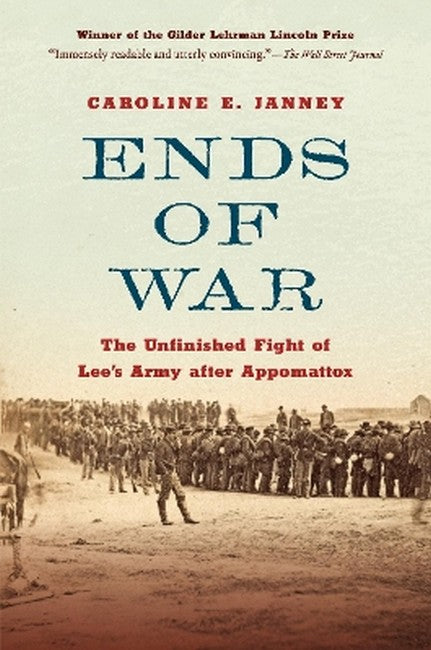Caroline E. Janney is the John L. Nau III Professor in the History of the American Civil War and Director of the John L. Nau III Center for Civil War History at the University of Virginia.
Request Academic Copy
Please copy the ISBN for submitting review copy form
Description
"A detailed and compelling analysis. . . . Janney's study is a welcome reminder that ending a war is a messy business, no more so than in the instance of the American Civil War."--America's Civil War "A very important book."--Virginia Magazine of History & Biography "Excellent. . . . Janney's detailed research of paroles for surrendered Confederates makes a major contribution to the field."--Journal of Southern History "If you're tired of reading about familiar Civil War events and eager to learn something new, every chapter of Ends of War will satisfy."--Civil War Monitor's Best Civil War Books of 2021 "Immensely readable and utterly convincing. . . . [Janney] offers a fresh and disquieting version of Lee's surrender, adroitly balancing official, political and military decisions with the recollections of the men on the ground who endured--and sometimes defied--its consequences. Anyone who still believes that the scenes around Kabul airport this summer were uniquely chaotic must read Ends of War."--Wall Street Journal "In the US, Janney is leading the charge in the study of the Civil War's conclusion and here offers a detailed examination, with numerous participant accounts, of Confederate General Robert E. Lee's surrender at Appomattox and the national confusion that followed for many months. Janney captures the legalities and military questions regarding how to implement parole, pardons, and amnesty; the difficulties of soldier repatriation or refusal to quit; the fear and distrust between North and South after Abraham Lincoln's murder; and the key issues involving newly freed African Americans in a tableau illustrating the birth of many American issues that persist today. . . . Recommended."--CHOICE "Janney evokes the human drama of Appomattox and the memory of Confederate soldiers at the end of the Civil War. She does a great job utilizing many primary sources in detailing the perspective of officers and enlisted men both, relating their stories from when the guns went silent and on their journeys home. This is history at its best by a wonderful author and historian."--NYMAS Review "Janney expertly explains the complications of these ambiguous terms and their inconsistent application. The author also makes an excellent case that Grant should have specified terms more clearly, although she also acknowledges that he had to act quickly as circumstances on the ground shifted from day to day...this detailed military history will find an eager audience among Civil War enthusiasts."--Library Journal "Remarkable. . . . Janney has performed a superb task in helping us understand our greatest war and the workings of the human condition."--Civil War Book Review "This beautifully written and engaging book will make an excellent addition to any graduate or undergraduate classroom. It is a valuable contribution to the military and political history of the Civil War."--Civil War Monitor

